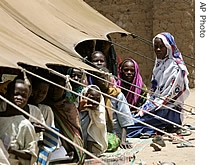2006年VOA标准英语-Sudan Repatriation Resumes From Ethiopia, CAR(在线收听)
By Lisa Schlein
Geneva
13 December 2006
The United Nations High Commissioner for Refugees begins returning to south Sudan an estimated 11,000 refugees from Ethiopia, Wednesday, and another 8,000 from the Central African Republic, Saturday, to the homes they fled years ago. Lisa Schlein reports for VOA from UNHCR headquarters in Geneva the agency expects the repatriation operation to go on for the next six months.
The repatriation was suspended from Ethiopia in May when the rainy season made the roads impassable. In the case of the Central African Republic, U.N. refugee spokesman Ron Redmond says the operation came to a halt in April, following the closure of the border between the CAR and Sudan.
 |
| Sudanese refugee children sit in their makeshift classroom, Wednesday, April 19, 2006 in the refugee camp Kou Kou Angarana in Chad some 30 kilometers from the Sudan border |
Redmond says the UNHCR has reached an agreement with the government of the CAR to reopen the border, but only for the purpose of repatriating Sudanese refugees.
He says the agency will airlift 150 Sudanese refugees from the CAR, Saturday, to Tambura in Western Equatorial region of south Sudan. He says there are plans to organize three flights each week to repatriate 8,000 of the 10,000 refugees in Mboki camp who want to go home.
The UNHCR spokesman says today's operation consists of a convoy of 10 buses and five trucks, transporting 500 refugees from Ethiopian camps to their villages in southern Sudan's Blue Nile State. That trip is expected to take four days.
He says all refugees returning from Ethiopia and the Central African Republic will receive a package of relief items to help them re-start their lives. This includes three months of food, seeds and agricultural tools.
He says all returns are voluntary. He says hundreds of thousands of refugees and millions of internally displaced people are reluctant to go back because the infrastructure in south Sudan was destroyed during the long-running civil war.
"For example, they want schools for their children. They want clinics. They need clean water," he said. "They need the support structure so they can resume farming or whatever business they were involved in. And, a lot of that infrastructure is gone. So, it has been rather difficult."
Nevertheless, Redmond says more than 90,000 Sudanese refugees have returned home from neighboring countries. Most have gone back by themselves. He says only 18,000 have asked the UNHCR for help in returning.
An estimated 350,000 Sudanese refugees remain in exile in five neighboring countries. Another four million people are displaced within Sudan.